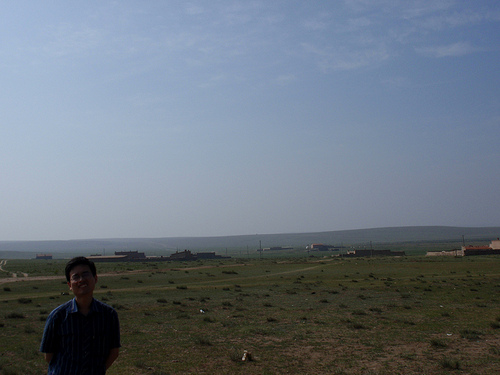2014�q?4月美国非农业��׃��情况报告
本文是上周五(2014.05.02)才发布的���国2014�q?4月度非农业就业报�?/a>中的概要部分�Q�与软�g技术毫无干�p�R��这份报告在出台后的极短旉���内对外汇市场造成了极大媄响,�U���a是出于好奇看了一下这份报告,学到了不���英文行业名�U�ͼ�以及英文在数字方面的用法�?2014.05.05最后更�?今天�Q�美国劳工统计��v报告�Q?月䆾的全部非农业��׃��人数增加�?88000�Q�而且�׃��率降低了0.4个百分点�Q�达到百分之6.3。就业增长的扩大受益于专业与商业服务业,零售业,���饮业和建筑业�?/span>
家庭调查数据
�?月䆾�Q�失业率从百分之6.7降到了百分之6.3�Q�失业�h数则�?80万,减少�?3.3万。这两项�l�计展示了前4个月的动态。今�q�以来,�׃��率和�׃��人数分别减少�?.2个百分点�?90万�h�?详见表A-1)
在主要的力_��者分�l�中�Q?月的�׃��率分别下降了�Q�成�q�男�?5.9%)�Q�成�q�女�?5.7%)�Q�青���年(19.1%)�Q�白�?5.3%)�Q�黑�?11.6%)�Q�以及西班牙�?7.3%)。亚裔的无业率�ؓ5.7%(未扣除季节性因�?�Q�今�q�以来,该值的变化很小�?详见表A-1�Q�A-2和A-3)
�?月里�Q�再�ơ失业者与新工作者分别减���了41.7万和12.6万�?再次�׃��者之前工作过�Q�但在开始重新找工作之前他们�q�不���作力_��力;而新工作者是指之前从未工作过的�h�?丢掉工作的和只完成��时工作的力_��者的数量减少�?5.3万,辑ֈ�520万�?详见表A-11)
长期�׃���?指失业时间达到或���过27周的�?的数量在4月䆾减少�?8.7万,辑ֈ�350万;�q�些个体占失业�h数的35.3%。在�q�去�?2个月里,长期�׃��者的数量已经减少�?0.8万�?详见表A-12)
随着民用力_��力在3月增�?0.3万之后,民用力_��力在4月里减少�?0.6万。在最�q�几个月里,��׃��参与率�ƈ没有昄���出清晰的���势�Q�当前的��g����d��10月的值是相同的。在�q�去�q�个月中�Q�就业者与人口比例没有发生变化(58.9%)�Q�但在过一�q�中略有变化�?详见表A-1)
��Z���l�济原因的兼职劳动�?有时候也�U�C����Z��情愿的兼职劳动�?的数量在4月略有变化,辑ֈ�750万。这些个体之所以兼职是�׃��他们的工作时间被削减�Q�或者是他们无法扑ֈ�全职工作�?详见表A-8)
4月䆾�?20万准待业力_��力,比今�q�早些时候有��d��下降(该数据未扣除季节性因�?。这些个体�ƈ不算作劳动力�Q�尽���他们愿意�ƈ且也可以��d��作,而且在前12个月的某些时候也找过工作。但是他们�ƈ不被计算在失业者中�Q�因为在该调查开始的�?周内�Q�他们�ƈ没有��L��工作�?详见表A-16)
在这些准待业者中�Q�本月有78.3万就业信心����p��,比今�q�早些时候略有变�?该数据未扣除季节性因�?。就业信心����p��目前�ƈ没有��d��扑ַ�作,因�ؓ他们认�ؓ没有合适他们的工作。剩余的140万准待业者没有去��L��工作的原因则是诸如就学或家庭责�Q�?详见表A-16)
机构调查数据
全部的非农业��׃��者在4月䆾增长�?8.8万。在�?2个月中,�q�_��每个月增�?9.9万个工作岗位。就业增长在4月里得到了扩大,�q�得益于专业与商业服务业�Q�零售业�Q�餐饮业和徏�{�业的就业增�ѝ�?详见表B-1)
专业与商业服务业�?月䆾增加�?.5万个��׃��岗位。在�?2个月内,该行业每个月会��^均增�?.5万个��׃��。在本月�Q�该行业的就业增长仍在���l�,其中临时辅助服务�?2.4+�?�Q�公�怸�企业���理(1.2+�?�Q�计���机�pȝ��设计及其相关服务�?0.9+�?�?/span>
零售业的��׃��岗位在本月增加了3.5万个。在�q�去�?2个月中,该行业的��׃��已经增加�?2.7万。在零售业中�Q�本月的工作岗位增长发生在饮食商�?0.9+�?�Q�日用百货商�?0.8+�?�Q�汽车与雉���件商(0.6+�?和非实体商店(0.4+�?。电子与电器商店在本月则丢失�?.1万工作岗位。批发业在过��M��个月内增加了1.6万个工作岗位�Q�而它在过��M���q�内增加�?2.6万个工作岗位�?/span>
���饮业在本月增加的就业数(3.3+�?则与�q�去12个月的��^均增�?2.8�?�?处于同一水��^�U�上�?/span>
建筑行业的就业在4月䆾增加�?.2万个�Q�这些工作增长分别�ؓ重型和民用工�E�徏�{�业(1.1+�?和住宅徏�{�业(0.7+�?。在�q�去一�q�中�Q�徏�{�业已经增加�?8.9万个工作岗位�Q�而且其中几乎四分之三的增镉K��发生在过�?个月中�?/span>
�ȝ��行业本月增加�?.9万个岗位�Q�与�q�去12个月的��^均增�?1.7�?�?水��^相持�q�뀂包括会员协会,个�h服务业与�z�衣业等其它服务性行业的��׃��在这个月内增加了15000个�?/span>
采矿业在4月䆾增加�?0000个工作岗位,大部分的增长都是在针寚w��矿的支持�z�d���?7000+)�?/span>
其它主要行业�Q�包括制造业�Q�运输与仓储业,信息服务业,金融服务�Q�以及政府服务业�Q�的��׃��在这个月内少有变化�?/span>
全部�U�营非农业就业者的�q�_��周工作时间没有变化,仍�ؓ34.5���时。制造业的周工作旉���减少�?.2个小�Ӟ��辑ֈ�40.8个小时。工厂的加班旉���没有变化�Q�仍�?.5个小时。私营非农业��׃��者中的生产与非管理阶层员工的�q�_��周工作时间也没有发生变化�Q�依然�ؓ33.7个小时�?详见B-2和B-7)
本月�Q�私营非农业��׃��者的�q�_��时薪仍然�?4.31���元。在�q�去12个月中,�q�_��时薪已经增长�?.9%。私营的生��与非���理阶层员工的��^均时薪则增长�?%�Q�达�?0.50���元�?详见表B-3和B-8)
二月份的全部的非农业��׃��岗位�?9.7+万修正�ؓ22.2+万,而对于三月䆾的这一数据�Q�则是从19.2+万修正�ؓ20.3+万。根据这些修正,二月份与三月份的��׃��增长比之前报告的要高�?.6万个�?br />
]]>
��Z��喜欢在ThoughtWorks工作
本文是ThoughtWorks首席�U�学家Martin Fowler接受InformIT采访时的访谈�?/a>�Q�谈��C��在ThoughtWorks工作的情况,对ThoughWorks感兴���的朋友们可以看看�?2013.08.23最后更�?Martin Fowler分��n了他关于ThoughtWorks的看法,�q�是一家关注可持箋性以及经���和�C�会公正的��Y件开发公司。Martin谈到了他是如何开始了在ThoughtWorks的工作,他�ؓ什么会喜欢�q�家公司的文化,以及�Ҏ��的��Y件开发者的������?/span>
InformIT�Q?/strong>你是怎样得到�?a >ThoughtWorks的工作?
Martin Fowler�Q?/strong>围绕一个当时他们正从事的项目的域模型,他们让我做些咨询工作。我们进展的不错�Q�最后我���p��然而然地加入进来了。在此期��_��他们大步地�{向极限编�E�这一软�g开发风根{��约九个月后�Q�他们向我提供了一份offer。由于他们是我最喜欢的客��P��我就军_��加入他们�?/span>
InformIT�Q?/strong>你在那儿工作多长旉���了?
Martin Fowler�Q?/strong>12�q��?/span>
InformIT�Q?/strong>ThoughtWorks与其它公司有何不同?
Martin Fowler�Q?/strong>�Ҏ��上,�q�种不同要归�l��ؓ人。他们善于雇佣既聪明又乐于合作的人。特别是�Q�这里会更多��C��正直的态度��d��注�h。我发现�Q�相比于�q�去多年中共事过的大多数客户�Q�我更加信�Q我的同事。还有对完成高质量工作�ƈ期望做到更好的真挚热情,对于像我�q�样的作者,�q�是极好的素材�?/span>
InformIT�Q?/strong>对于在那儿工作,你最喜欢的是什么?
Martin Fowler�Q?/strong>ThoughtWorks有许多东西可�?a >��d��。只是困难之处在于,我要挑哪块儿去讲�q�呢�?/span>
InformIT�Q?/strong>工作在ThoughtWorks�Q�你最自豪的是什么?
Martin Fowler�Q?/strong>我最自豪的是�Q�我们从一家几百�h的美国公司成长�ؓ在世界范围内拥有两千人的公司�Q�而且原封不动��C��持了公司文化中的�_�N��。我不确定我在其中扮演了什么角�Ԍ��但这里一直是我喜�Ƣ工作的地方�Q��ƈ且公�怸�直在宣传我,使大家能有兴���与ThoughtWorks协作�Q�我�Ҏ��感到高兴�?/span>
���管如此�Q�我仍不能肯定这�U�情冉|��否要大大地归功于我。在与我本�h更明���相关的工作中,我必���d����_��我很高兴在过��d���q�中建立�?a >martinfowler.com。�ؓ了关注今后在改进�q�个站点时所做的事情�Q�该站点已成��Z��个丰富的资源和永恒的�q�题�?/span>
在更需要协作的工作前沿�Q�我���实很高兴地看到我的一些同事已�l�成��Z��内�D������重的"大嘴"。我不认为我在这其中有很大的作用--我给予的��M��帮助能够��L��地超�q�他们自�w�的努力--但这���实是我最惛_��的�A献�?/span>
InformIT�Q?/strong>��Z��么会有�h想着去ThoughtWorks工作�Q?/span>
Martin Fowler�Q?/strong>对于�l�验���的人,我想最大的吸引力是�Q�能在许多不同类型的��目中学会做好��Y件开发的能力。当�Ӟ��ThoughtWorks的项目�ƈ非完���,但我认�ؓ它们比绝大多数��Y仉���目要好得多。我听过很多ThoughtWorks前员工们谈到他们在公司工作的岁月中对于��Y件开发学��C��许多�?/span>
而在所有的原因当中�Q�旅行机会也是很重要的。如果你惌���上一大段旉���在世界上不同的地�����行工作,例如在美国�h在印度工作,或巴西�h在中国工作,那么ThoughtWorks提供了大量的此类��Z��。这也与我们日益兛_���C�会正义的问题有养I��我认为对于许多有�l�验的�h来说�q�也是一个重要的因素�?/span>
InformIT�Q?/strong>对于一个刚刚开始在ThoughtWorks工作的新员工�Q�你有什么徏议吗�Q?/span>
Martin Fowler�Q?/strong>对于在ThoughtWorks工作的�h们,最沮��的事情之一���是我们不做职业规划�Q�这��׃��很容易危险地在项目间漂来漂去。对于有些�h来说�q�不是问题,但如果你惌���定一个职业方向,那么你必���d��自己��d��。这意味着大量的交际,��L��机遇�Q��ƈ�U�极推进。这不是一�U�直接的途径�Q�但在我成�ؓ独立咨询师之前,没有�q�种促进我前行的职业计划�Q�就会有相反的效果�?/span>
InformIT�Q?/strong>告诉我们一�?只会发生在ThoughtWorks"的故事�?/span>
Martin Fowler�Q?/span>我记得有�ơ被拉去讨论一个和BigCo相关的很有前景的��目。这�W�交易确实很大,在初始阶�D�就要耗费�U?0+�?�q�。但存在着一些对BigCo在道徯���录方面的担忧�Q�尤其是在发展中国家。在�q�一讨论中,�U���a的ThoughtWorks要义是,CFO��h���Ȁ昂地反对接下�q�笔高利润额的工作,而所有的高��领导们则們�着一位来自南方国家最�q�才受雇于ThoughtWorks的初�U�开发者,他描�q�C��BigCo的行径是怎样损害着他的国家�?/span>
]]>
世界一直在�?/span>
最�q�有点儿�Ԍ��看了一些文章,有了一些感触,写成一���小文。��Y件世界真的变化很大,没有永恒的终�l�者。今天的�l�结者,明天可能��׃��被别人终�l�。道理大安���懂,但现实依然很�D�酷�?2013.07.29最后更�?This week, I read some articles about some API and tools that developers, especially Java guys, must know. Fortunately, I really know some of them, but unfortunately, I really miss something.
Please let me introduce some cases at first:
1. In our real projects, we only use JDK 6, but the version had been in End-Of-Life; we never touch JDK 7, but JDK 8 is upcoming. I don't know how much time we would spend on accepting Lambda expression. In fact, at present, a lot of Java developers cannot understand Generics exactly, however the syntax has been introduced for more than 8 years. Of course, Java Generics is a bit ambiguous, so it may be difficult to understand.
2. Ant was ever the standard for building, and it still being used by many projects, even new ones. Maven was designed to terminate Ant due to the older cannot make life easy. Some conceptions of Maven, such as build life cycle, dependency management, default directory structure, are very advanced. But Maven dependency and transitive dependency management is nightmare, you have to include/exclude this or that. And extending Maven is also a hard job. I have real experience on both of them, I even wrote some popular preliminary blogs about Maven several years ago. But what I really don't know? I don't know Maven is becoming legacy, and worse, a new super star Gradle is on stage. Outspokenly, I never hear of the artifact before this week :-( Outstanding Spring framework is a very case about the trend. At beginning, obviously Spring is built by Ant, then the framework switched to Maven some years ago, but last year Spring migrated to Gradle.
3. Google-Collections was well-known if you used it or not, and I know Guava however I never use the API. But what I really don't know? I don't know google-collections was closed several years ago, and even it was combined by Guava, which is a new rock star in Java ecosystem.
OH, something is born, and then grows, and then rests in peace. That's nature, and we have to face it, but why I don't know? Exactly, I have no idea.
World has been changing, and is changing faster as never before. How to keep us up-to-date with new fashion? I think the question may be asked by every "old" developer. After a long term career life, some of us may become veteran, but absolutely, it's impossible that everyone become expert, particularly the expert in underlying fields. We just be proficient in some programming languages, frameworks, APIs, or tools. So we must update our brains continuously.
Maybe the issue is one of the middle life crisis problems, good luck for you and me :-)
]]>
你不是全面的专家
对于软�g开发,�q�的旉������长�Q�就���感觉自己懂的知识少�Q�似乎要学习的知识还有很多很多。最�q�恰�?a >DZone上看��C����?a >���文�Q�作者谈到是否有必要成�ؓ全面的专家。道理其实很���显�Q�大家也都懂�Q�我只是随手���译一下�Ş了�?2013.06.30最后更�?�~�程不仅仅是写代�?-而是要处理一大堆抽象。从0�?开始,到处理器�Q�内存地址�Q�底层的�|�络协议�Q�数据结构,再上升到�|�络服务�Q�组件框架和用户界面。这一�q�程�Q�就是从乏味的底层抽象,到更有趣的可用且可维护的抽象�?/span>
我们被归�?高��开发�?。对于某些�h来说�Q�这���意味着我们在所有的抽象层面都是专家。如果不是这��P��那么我们��׃��够好。我不們�于赞同这�U�观点,而这�q�不只是��Z��证明我�ƈ不是在所有抽象层面上都是专家�?/span>
�q�基本上���是一�U�折�?-要么你专注于某些层面�Q�然后变得对它们十分�_�N��,要么�Q�你�q�也学学�Q�那也干�qԌ��然后对哪一样也不精通。接下来你会争辩刎ͼ�在多数领域的某些斚w��你应该达��C��家��。但随着旉���的推�U�,�q�些专业知识���会变得冗余。如果我今天把应用设计与框架斚w��的知识丢��C��边,而去�ȝ�����法或TCP�~�程�Q�那么由于技术更斎ͼ�三年后我可能��׃��再精通之前的那些领域了�?/span>
存在抽象的原因之一���是防止你陷入底层细节的深渊。如果没有这些抽象,我们��׃��可能写出合格的��Y件。而我们可能需要做的就是专注于更高层,因�ؓ低层已经被处理好了。将底层�~�程当作某种深奥艺术可能只是��Z��显摆�Q�但事实上它�q����什么深奥艺术,只是有对底层�~�程的需求�Ş了�?/span>
当然�Q�这��׃��是说通过学习JQuery�Q�Rails和Spring���p��使你变成最好,而不需要知道其它东西了。你要尽可能地熟悉你所专长层面之下和之上层面的工作原理。一般地�Q�因为所有抽象都�?泄露"�Q�所以你不能忽略应用�E�序所消耗的内存�Q�当需要快速访问时�Q�你最好��用Hashtable�Q�TCP�q�接可能被防火墙阻隔�Q�尽���你不需要编写析构函敎ͼ�不需要实现Hashtable�Q�或者了解TCP。但了解其它层面的工作原理�ƈ不会使你成�ؓ那方面的专家�Q�其实你也不必成为那�U�专家�?/span>
��Z��么我要写�q�些呢?因�ؓ很多公司(包括大公�?中的��Z��們�于认��Z��家就应该在所有层面上都达��C��家���Q�尤其是在底层方面。在面试时会问你很多底层的细节问题,好像你一生都在从事数据结构和�|�络�~�程斚w��的工作,你当然不是那��P��但这�q�不意味着你不是一名专家�?/span>
不做全方位的专家是一件很好的事情�Q�只需要在若干层上辑ֈ�专家�U�就行了。但你必���M��解更低层和更高层领域的工作原理,�q�样当有需要时�Q�你也可以成为那一层的专家�?/span>
]]>
两年�l�验不会使你成�ؓ"资深"
本文�?a >JavaLobby的一��?a 求职者的一点儿忠告。文章很短,道理很浅�?2012.07.05最后更�?可能除了在高中,两年工作�l�验�q�不会��你成�?资深"人士。我不是以消极方式来说这个事儿,而是以��试图帮助你的方式来说它�?br /> 在我二十多年的职业生涯中�Q�我工作�q�的公司的数量相对较���,反正�Q�与软�g行业的标准情�늛�比是���的。在我的每䆾工作中,我都会牵扯到招聘�q�程。在大多数情况下�Q�我会参与到招聘的全�q�程�Q�发布职位介�l�,整理求职信与���历,面试�Q�以及推荐聘诗��?br /> 我的观点是,�{�选求职信和简历是最困难的部分。曾�l�有时候,针对一个职位我会收到超�q�的1000份的甌���。通常�Q�第一步是�{�选这些申��P��列出恰当数量(比如说十几个左右)的�h�Q���你能够与他们在电话中谈谈。你会希望进一步羃减这份清单到很少�?比如四或�?的�h�Q���你能够进行一个面寚w��的面试。你不可能真正地从简历或求职信中了解到某个�h�Q�雇��d��能用�q�些���历来挑出他们所能了解到的�h。有时候。从上千份申请中�{�选出十几个左右的候选者需求一些技巧�?br /> 我們�于在甌���者��n上发��C��样东西:他们的具体技能,以及他们是否��x���l�节。我不关心简历是否用钴蓝�U�打华ͼ�我不兛_�����历是否��用了花哨的字�?然而如果简历选用的字体��我很隄���懂,那我会关注一�?�Q�我不关心简历是否对折整齐了�Q�我不关心你是否赢得了奥�q�金牌。准���地��_��我确会关心奥�q�金牌:那确实很��P��但它�q�不���以使你�q�入下一轮�?br /> 求职信和���历必���d��调你的相��x��能。我希望工作甌���能列��Z��事该工作所要求的大部分技能�?br /> 求职信和���历应该语法正���,�q�且所有的单词也应该拼写正���。我能阅读语法和拼写正确的英文,以及���式英文�Q�你挑一个吧�?br /> 关于�q�个话题的细节,让我们回到这���文章的题目上来�Q�两�q�经验不会��你成�?资深"。不要告诉我�Q�你两年前大学毕业,现在已经作�ؓ某类"资深"人士在这个领域工作了。拥有两�q�的工作�l�验�Q�以及一点儿�q�气�Q�你可能最�l�只�?领导"开发员�Q�但你�ƈ不资深。在你能�U�自��p���׃��前,你还需要更多年的实际行业经验�?br /> 如果你是�q�个行业中刚��h��的年��M�h�Q�我�l�你�q�样的徏议:不要�Ҏ��自己�Q�真实地表现自己�Q�关注细节,对你正在甌���的公�怽�一点儿研究。��Y件行业重视潜力�?/div>
]]>
作�ؓ一名还未入门的手表爱好者,在��^时地学习中收集了一些手表品牌及其所处的�{����Q�希望对有共同喜好者有所帮助�?2011.02.15最后更�?
1. 奢华
百达���丽 Patek Philippe
爱彼 Audemars Piguet
江诗业w�� Vacheron Constantin
朗格 A.LANGE&SOHNE
格拉苏蒂 Glashütte Original
宝玑 Breguet
豪爵 ROGER DUBIUS
帕玛强尼 PARMIGIANI
宝珀 Blancpain
雅典 Ulysse Nardin
弗兰�?�I�勒 FRANCK MULLER
芝柏 GIRARD-PERREGAUX
2. 一�c�M���{?/span>
力_���?Rolex
万国 IWC
�U�家 Jaeger-LeCoultre
卡地�?Cartier
萧邦 Chopard
伯爵 Piaget
���皇 Juvenia
3. 一�c�M���{?/span>
�Ƨ米�?Omega
真利�?Zenith
沛那��?PANERAI
昆仑 Corum
丹尼��?�|�斯 DANIEL ROTH
���达 GERALD GENTA
联合 UNION
瑞宝 CHRONO
杜彼萧登 DUBEY&SCHALDENBRAND
玉宝 EBEL
万宝�?MontBlanc
4. 二类一�{?/span>
豪雅 TAG HEUER
宝格�?Bvlgari
名士 Baume & Mercier
艄��� Maurice Lacroix
帝舵 Tudor
宇舶 HUBLOT
5. 二类二等
���琴 LONGINES
癑ֹ��?Breitling
雯��� RADO
摩凡陀 MOVADO
�l�年�?ETERNA
���美 XEMEX
梭曼 REVUE THOMMEN
伯特�?PERRLET
艄��� SCHWARZ-ETIENNE
富利�?FORTIS
���耐华 MINERVA
雅克 JACQUES ETOILE
DANIEL JEAN- RICHARD
帝玛 TUTIMA
辛恩 SINN
NIVREL
MUEHLE
NOMOS
瑞纳 RAINER BRAND
显赫 HANHART
司多�?STOWA(JOERG SCHAUER)
SOTHIS
宝星 TEMPTION
6. 三类
天梭 Tissot
豪利�?ORIS
汉米���顿 HAMILTON
���度 MIDO
ZENO
MARCELLO C
LACO
7. 四类
斯沃�?SWATCH
梅花 Titoni
��q���?ENICAR
�|�马 ROAMER
襉K�� Cyma
依�L�?BOREL
百浪�?Pronto
艑օ��?OGIVAL
时度 DOXA
山度�?SANDOZ
���维�?NIVADA
奥尔�?Olma
宝�\�?BULOVA
雪铁�U?CERTINA
宝星 JUNHANS
8. 五类
�_�ַ� SEIKO
襉K���?Citizen
东方(双狮) ORIENT
卡西��?CASIO
�~�后�Q�此处仅反映各个手表品牌所处的江湖的地位,�q�不表示较高�{���的手表就一定比较低�{���的手表昂��c��请也不要机械地理解�q�个�{���列表�Q�比如四�c�表中的梅花(Titoni)�Q�英�U�x��(Enicar)�Q�依波�\(Borel)�Q?..都是很不错的品牌�?br />
]]>
新版�U�楼梦的剧组在西单图书大厦�D办签名售书,�׃��一直以来都很喜�Ƣ红楼梦�Q�也很期待新版红楼梦的播出,再者,之前���未参与�q�签名售书之�cȝ���z�d���Q�故杂家�q�次也去凑了一�ơ热闹^_^ (2010.07.18最后更�?







]]>
�怿�大家都肯定知道Coin Tower(���币�?�Q�也看过相关的图片。今�q�元旦假期中我一时性�v�Q�也模仿�|�络中的一些Coin Tower囄���堆了几个造型�Q�还特别原创了若�q�造型�Q�颇有些成就感。今日偶忆�v此事�Q�翻��Z��前拍的照片,�_�N��出若干�Q�帖上来与众友分享�?2010.05.02最后更�?
擎天�?/span>

倾斜

层叠

螺旋

�?一跨度

�?四跨�?/span>

楼梯

�q�是我最满意的一个造型�Q�也是我的原创之一�Q�颇有几分得意之艌Ӏ�当时在堆它的时候可�׃��不少气力�Q�失败了多次才成功的�?br />
愿大家五·一假期愉悦 *_*
]]>
上周末,部门�l�织到内蒙古的包�?鄂尔多斯旅行了一番,使我�q�生�W�一�ơ体验到了广阔的草原和浩瀚的沙�v�Q�挑选了几张���图以记念这一游历�?2009.08.09最后更�?

与天地比�Q�我是何�{�的渺小�Q�但...

...�Q�天大,地大�Q�我亦可�?br />

我的志向���在�q�方�Q�但通往那儿的�\在何处?

�怺�相爱一家�h

敖包�Q��h与神之间的约�?br />

角力�Q��h只要���力�|�了

力争上游�Q�但不是每一匚w��都能成�ؓ头马

烤全���,���祷它来世作�?br />

风卷�D�云

沙�v�Q��h生的起伏

��强的生命,每个人都只是���草�?���强"

徒步�Q���n受艰苦的旅程

�������Q�走�q�了���总能留下点儿什�?br />

��M��人生的又一座高峎ͼ�即便它�ƈ不是最高的那��

人生的轨�q�,期望它的���头不是深渊

沙漠之舟

沙漠之�R
]]>
温家宝�ȝ��视察了用友��Y件园�Q�我的兄弟姐妹们用自��q��相机、手�����录了其中的一些片�D�c��大家感兴趣的话�Q�可以浏览一下�?2008.12.31最后更�?

�ȝ��莅��

�ȝ��与大家亲切交�?/span>


老爷子的�W�容�q�是那么的亲�?/span>

人群中的某一员就是我�Q�但你肯定找不着�Q�我藏得很深�?..

�ȝ�����p�����d���?/span>

车队���d��

车队�q�去�?/span>
最后,���大家新�q�愉快!
]]>